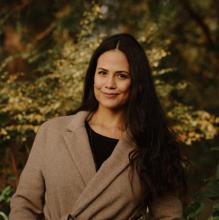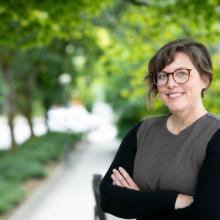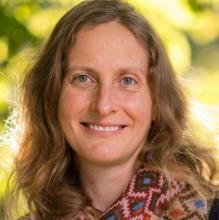Andrea's research is devoted to co-creating knowledges to address the issues affecting Asheninka and Yine Indigenous realities in the Peruvian Amazon. A descendant of the Quechua Indigenous People from the Andes, Andrea listens to stories and visions of the past, present, and the future to co-develop protocols, methodologies, and knowledges embedded in Indigenous perspectives with the aim to influence policies.
Research Description
I was invited by Asheninka and Yine community members to collaboratively conduct research that prioritizes Indigenous Peoples’ concerns and desired futures. I am part of a pluri-cultural Indigenous research team and our work in the long term has three purposes: (1) responding to the social, political and environmental disruption afflicting Peruvian society with recommendations elaborated by the Indigenous Peoples themselves as principal and historically affected by this disruption, (2) promoting spaces for self-representation of Indigenous Peoples' voices and suggestions for the drafting of public policies that affect Indigenous realities, and (3) mobilizing the co-created knowledges within and outside of Indigenous Peoples’ realities, make it accessible to them in their own languages, and deliver it according to procedures appropriate to the communities.
What does being a Public Scholar mean to you?
For me, it means service to the public: to the people. A public scholar is a critical investigator that researches what peoples envision for their futures and addresses with the research current issues that affect our societies, which exist in a broader context and place: Planet Earth/Mother Earth/Pachamama (that is full other beings and elements with whom we constantly interact, affect, and are affected by). For that research to be congruent with peoples’ desired futures, and to build healthy societies, it is important to develop collaborative research. The definition of the topic, the questions that will guide the research, the methodology, and the methods are collaboratively designed, and the research is collaboratively conducted. Therefore, the power in the process is shared with collaborators, there is a relational accountability, and constant feedback from them.
In what ways do you think the PhD experience can be re-imagined with the Public Scholars Initiative?
It is not easy to find funding to co-design a project with collaborators or for knowledge mobilization activities. Thanks to funding provided by the PSI during 2015 and 2016, we were able to re-imagine the project we are collaboratively designing to make it more responsive to communities' objectives. With this initiative we can have a truly bottom-up and more culturally-sensitive project in which communities themselves are the ones who prioritize the research theme and collaboratively conduct the whole study.
I re-imagine the experience of a doctoral education in an environment that is more academically, institutionally, ethically, emotionally, and spiritually supportive of the type of work we are doing. I believe that research is not values-free, so I re-imagine a more respectful, meaningful, critical, holistic, and consistent research necessary to build healthier societies that consider our histories, analyze the present, and work toward more fair futures for humans, other-than-humans and more-than-humans living on this planet. I am delighted to continue this journey together.
How do you envision connecting your PhD work with broader career possibilities?
I see the experience and knowledge earned during the PhD as the beginning of a public service career. I see myself working for a research institution, civil society association, government or working for a conscientious and responsible organization that focuses on service to the people. I envision collaboratively developing and conducting work that is culturally sensitive and respectful to the historically marginalized societies.
How does your research engage with the larger community and social partners?
We work collaboratively with Indigenous Peoples from the Amazon. Although one of the great legacies of colonization in Peru is discrimination, 40% of the Peruvian population recognize ourselves as Indigenous. Although Indigenous Peoples represent a large percentage of Peru's population, our influence on policy is limited. There are several as-yet unaddressed rights claims by the more than sixty different Indigenous Peoples. Thus, the research we do with Indigenous Peoples in the Amazon attempts to remove the barriers to their voices, perspectives, worldviews, and values being heard and to influence policy from the bottom-up. Toward that purpose, we also work with their institutions (Indigenous federations) at the local and regional level, for them to elevate the research findings and influence policy-making processes. I believe that research that is for the public good always should include aspects of culturally sensitive knowledge-mobilization as a key component in the design.
Why did you decide to pursue a graduate degree?
I have witnessed that when public, private, and academic actors have pursued work with Indigenous Peoples, they (often) put forward agendas that are distinctly different from that of the Indigenous Peoples (in terms of their values, methodologies, desires and desired futures). The Indigenous research team I am part of, the Asheninka and Yine communities, and their federations are prioritizing the communities' objectives. I am interested in pursuing research that is truly in the Indigenous Peoples’ interest.
Why did you choose to come to British Columbia and study at UBC?
I was interested by the work of many scholars here.
I re-imagine the experience of a doctoral education in an environment that is more academically, morally, emotionally, and spiritually supportive of the type of work we want to do.




